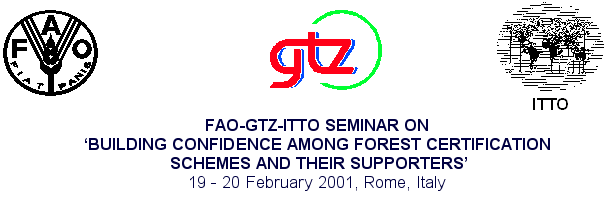



FAO-GTZ-ITTO SEMINAR ON BUILDING CONFIDENCE AMONG
19-20 February 2001, at FAO, Rome, Italy Liviu Amariei E-mail: [email protected] The forest stewardship council shall promote
environmentally appropriate, To promote the good management of the world forests
through an RELATING TO NATIONAL INITIATIVES AND STANDARDS · Contact Person Agreements RELATING TO CERTIFICATION SYSTEMS · Include evaluation, approval, continuous improvement, correction and
monitoring of the systems used by accredited and applicant certification
bodies · Collaboration with other certification systems,
like LEI, in form of joint certification assessments. · De facto mutual recognition between accredited certification
bodies The FSC will continue to show an open attitude
towards collaboration with other Any future engagement in collaboration agreements and
mutual recognition has to preserve · STANDARDS Performance-based standards
that must · Ensure forest management that is
environmentally sound, socially beneficial and economically viable
· Apply effectively to individual forest
management units or well defined groups with appropriate level of commitment
· Achieve credibility to a large range of involved stakeholder interest groups
· STANDARDS Performance-based standards that
must · Achieve equal treatment and non-discriminatory market impact · Be developed by multistakehoder consultative
process and demonstrate stakeholder support · Include provision for continuous development
and improvement · Satisfy all requirements of each of the certification systems
involved · ACCREDITATION AND CERTIFICATION
SYSTEM · Independent, third party certification Any collaboration or mutual recognition agreement
must include The protocols of all parties should be satisfied, by
agreement, to ensure the substantive equivalence of · Satisfies the protocols of FSC and
the National
Standards Organization · Ensures substantive equivalence between the standards
endorsed by the two bodies Since its founding in 1993, the FSC has been active in terms of
collaboration with other parties involved in forestry certification and
FSC has achieved internationally a high level of credibility. The FSC will maintain an open attitude towards collaboration with
other entities and certification systems, with the legitimate desire
that certification maintain a high level of credibility to the
public.
FSC PRESENTATION
FOREST CERTIFICATION SCHEMES
AND THEIR SUPPORTERS
FSC Regional Coordinator
for Europe & Africa
Tel/Fax.
+52-951-62110 Ext.115
Tel: +52-951-46905
website: www.fscoax.org
Our Mission
socially beneficial, and economically
viable management of the world's forests.
Objective of FSC
independent and voluntary certification
program
COLLABORATION AGREEMENTS
· Working Group
Agreements
· Endorsement of regional/national standards
· Agreements
with non-endorsed National Initiatives
· Certification bodies' generic
standards
· Other standards organizations
FSC POSITION
certification schemes and
mutual recognition aimed at serving our mission and the world's
forests.
CREDIBILITY
the credibility of forestry
certification and have a comprehensive technical base
KEY ELEMENTS (1)
KEY ELEMENTS (2)
KEY ELEMENTS (3)
·
Certification bodies accredited by clear and recognized accreditation
procedures
· An adequate level of monitoring
· Include dispute
resolution systems at all appropriate levels
· Cost effective
·
Equivalent requirements are satisfied by all certification bodies
MESSAGE TO THE PUBLIC
provisions for avoiding confusion or misleading public
statements
SUBSTANTIVE EQUIVALENCE
the
processes, standards and results.
EXAMPLE

FSC POSITION ON COLLABORATION AND MUTUAL
RECOGNITION